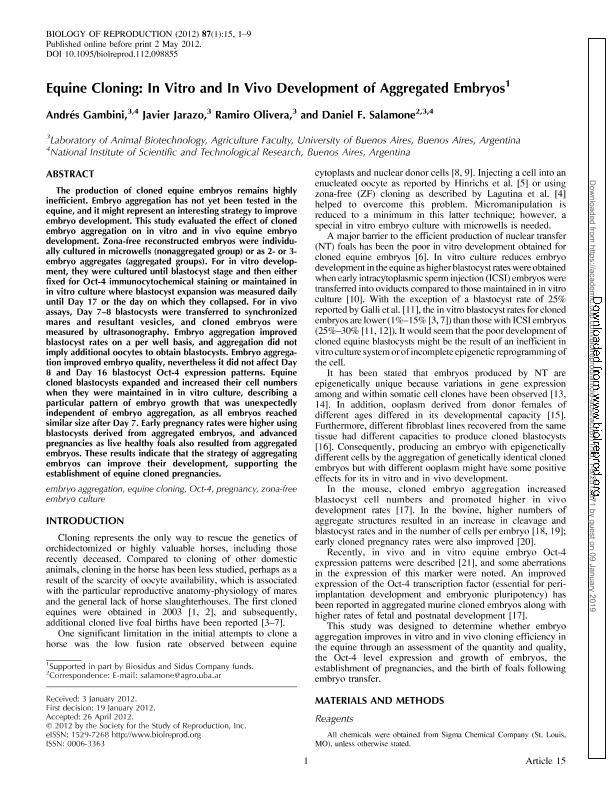Mostrar el registro sencillo del ítem
dc.contributor.author
Gambini, Andres

dc.contributor.author
Jarazo, Javier
dc.contributor.author
Olivera, Ramiro
dc.contributor.author
Salamone, Daniel Felipe

dc.date.available
2017-05-11T15:37:40Z
dc.date.issued
2012-07
dc.identifier.citation
Gambini, Andres; Jarazo, Javier; Olivera, Ramiro; Salamone, Daniel Felipe; Equine cloning: In vitro and In vivo development of aggregated embryos; Society For The Study Of Reproduction; Biology Of Reproduction; 87; 1; 7-2012; 1-9
dc.identifier.issn
0006-3363
dc.identifier.uri
http://hdl.handle.net/11336/16296
dc.description.abstract
The production of cloned equine embryos remains highly inefficient. Embryo aggregation has not yet been tested in the equine, and it might represent an interesting strategy to improve embryo development. This study evaluated the effect of cloned embryo aggregation on in vitro and in vivo equine embryo development. Zona-free reconstructed embryos were individually cultured in microwells (nonaggregated group) or as 2- or 3-embryo aggregates (aggregated groups). For in vitro development, they were cultured until blastocyst stage and then either fixed for Oct-4 immunocytochemical staining or maintained in in vitro culture where blastocyst expansion was measured daily until Day 17 or the day on which they collapsed. For in vivo assays, Day 7–8 blastocysts were transferred to synchronized mares and resultant vesicles, and cloned embryos were measured by ultrasonography. Embryo aggregation improved blastocyst rates on a per well basis, and aggregation did not imply additional oocytes to obtain blastocysts. Embryo aggregation improved embryo quality, nevertheless it did not affect Day 8 and Day 16 blastocyst Oct-4 expression patterns. Equine cloned blastocysts expanded and increased their cell numbers when they were maintained in in vitro culture, describing a particular pattern of embryo growth that was unexpectedly independent of embryo aggregation, as all embryos reached similar size after Day 7. Early pregnancy rates were higher using blastocysts derived from aggregated embryos, and advanced pregnancies as live healthy foals also resulted from aggregated embryos. These results indicate that the strategy of aggregating embryos can improve their development, supporting the establishment of equine cloned pregnancies.
dc.format
application/pdf
dc.language.iso
eng
dc.publisher
Society For The Study Of Reproduction

dc.rights
info:eu-repo/semantics/openAccess
dc.rights.uri
https://creativecommons.org/licenses/by-nc-sa/2.5/ar/
dc.subject
Embryo Aggregation
dc.subject
Zona Free Embryo Culture
dc.subject
Equine Cloning
dc.subject
Oct-4
dc.subject.classification
Biología Reproductiva

dc.subject.classification
Ciencias Biológicas

dc.subject.classification
CIENCIAS NATURALES Y EXACTAS

dc.title
Equine cloning: In vitro and In vivo development of aggregated embryos
dc.type
info:eu-repo/semantics/article
dc.type
info:ar-repo/semantics/artículo
dc.type
info:eu-repo/semantics/publishedVersion
dc.date.updated
2017-05-08T21:20:39Z
dc.identifier.eissn
1529-7268
dc.journal.volume
87
dc.journal.number
1
dc.journal.pagination
1-9
dc.journal.pais
Estados Unidos

dc.journal.ciudad
Madison
dc.description.fil
Fil: Gambini, Andres. Universidad de Buenos Aires. Facultad de Agronomía. Pabellón de Zootecnica. Laboratorio de Biotecnología Animal; Argentina. Consejo Nacional de Investigaciones Científicas y Técnicas; Argentina
dc.description.fil
Fil: Jarazo, Javier. Universidad de Buenos Aires. Facultad de Agronomía. Pabellón de Zootecnica. Laboratorio de Biotecnología Animal; Argentina
dc.description.fil
Fil: Olivera, Ramiro. Universidad de Buenos Aires. Facultad de Agronomía. Pabellón de Zootecnica. Laboratorio de Biotecnología Animal; Argentina
dc.description.fil
Fil: Salamone, Daniel Felipe. Universidad de Buenos Aires. Facultad de Agronomía. Pabellón de Zootecnica. Laboratorio de Biotecnología Animal; Argentina. Consejo Nacional de Investigaciones Científicas y Técnicas; Argentina
dc.journal.title
Biology Of Reproduction

dc.relation.alternativeid
info:eu-repo/semantics/altIdentifier/doi/http://dx.doi.org/10.1095/biolreprod.112.098855
dc.relation.alternativeid
info:eu-repo/semantics/altIdentifier/url/https://academic.oup.com/biolreprod/article/2513871/Equine
Archivos asociados
